 Image via WikipediaOur family is in the complaint process, I think our situation is probably extreme. It all began four years ago when a fellow RISE Parent brought me in to their group. We became aware of glaring omissions and violations.
Image via WikipediaOur family is in the complaint process, I think our situation is probably extreme. It all began four years ago when a fellow RISE Parent brought me in to their group. We became aware of glaring omissions and violations.Being a mom and a reformer at heart, I got training from a group called Insource and anywhere else I could get it, and I started working to improve our school's services and IEP. Four years later, here we are. Still fighting to reform an even more broken system.
And I am tired. I'm tired because my son matters. It's a truth. Every child in RISE Learning Center matters. They deserve protection and service, true humanitarian service, and each of us should carry the burden of these kids' challenges and obstacles in our hearts, but there are a few who just. . . well, they don't. It's not a mission. It's a job.
If you have the mission. . .
Your thoughts are preoccupied with how to do better each day for these sweet souls. You set your ideals far beyond the demands of your pocketbook or your ambition. You want for them what you want for yourself.
We want opportunity. All kinds of opportunities are denied those housed in this building each day. Some are denied the opportunity to communicate. They have no system by which to speak their wants and wishes, nor are they being given one. Some are denied the opportunity to learn by being placed in programs inappropriate to their needs. Some have been denied peace because no one stopped the bullying and beatings. The mission is lost at RISE, and it's not coming back very quickly.
Parents have gone to the DOE, the superintendent, Dr. Little, even the boards. Nothing changes. Okay, maybe it gets worse, but that's not change worth having. Families withdraw their children from this system and go it alone when no remedies emerge.
Ours may be next. How long can we wait, let Darrel wait, for adults to get the mission? How much farther behind can these kids fall before we act to stop systemic corruption and ineptitude? How much more can parents be expected to do? If we have to sue the school, which most can't, it will wipe us out with no likelihood of recouping anything without wheelbarrows of proof that we aren't lying or overreacting or reaching or exercising a vendetta or all the other things administrators say to steal our credibility or divert attention from facts.
Efforts to discredit the parents of RISE have never stopped and likely never will, but one thing is certain we aren't backing down. We have the mission. Each one us got it handed to us in a hospital both on the day of our child's birth and the day of their diagnosis. The mission to serve our children as advocate, parent, interpreter and care giver is a reality of every single day.
To parents facing the unfairness and discrimination of education systems gone awry, I say, " Never give up. Never surrender. Your children matter." Guess I just need the reminder.







